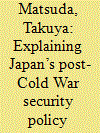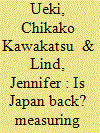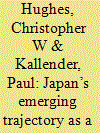| Srl | Item |
| 1 |
ID:
143352


|
|
|
|
|
| Summary/Abstract |
East Asian theatre is fast evolving. China’s arrival as a major power in international politics is altering the existing regional balance of power and intensifying Japan’s quest for securing a rightful place in the international system. Japan is reacting to the asymmetrical power politics and Shinzo Abe is increasingly becoming restless in attempting to redefine Japan’s secondary power identity. This requires undoing the limitations that were forced on Japan in the post-war period, including the constitutional restrictions, especially the pacifist clause. Amid fiercely contested domestic debate, reinterpreting the pacifist constitution is certainly a bold step towards infusing clarity in Japan’s future security role. The key objective is to convey to Japan’s allies concerning the manner the SDF will cooperate with the US and other regional powers, such as Australia, India, Philippines, etc. How this ‘limited’ right to collective self-defence will translate into operation will remain to be seen. To understand the rapidly unfolding policy shift, it is imperative to understand the different waves of the debate on collective self-defence and deconstruct the recent cabinet decision; explore the arguments of the competing schools of thought in Japan; examine the nuances and drivers that propelled Japan to redefine its passive constitution; and understand how regional and extra-regional powers evaluate this policy reorientation. Few regional stakeholders raised an alarm over the approach adopted by Abe to achieve the policy objective underscoring his militarist ambitions. While the aggressive historical baggage has caused considerable unease, it is premature to be alarmed over Japan’s shifting security posture as possible re-militarisation is unlikely to represent the traits of Imperial Japan.
|
|
|
|
|
|
|
|
|
|
|
|
|
|
|
|
| 2 |
ID:
175662


|
|
|
|
|
| Summary/Abstract |
Why has Japan shifted towards a more active security posture since the end of the Cold War? Japan’s security policy under Prime Minister Abe has triggered numerous discussions on the changing nature of Japan as a security actor. This article identifies two independent variables—the balance of power calculations and secure access to the maritime commons—that informs Japan’s security policy trajectory. It argues that Japanese strategy is best described as ‘maritime realism’, a posture in which liberal internationalist and realist elements draw upon principles of maritime strategy to fuse together. Japan has not only actively facilitated US commitment to maritime Asia but also focused on expanding its role in maritime security as the maritime space in the Indo-Pacific has increasingly become a contested space. While Tokyo’s security policy corresponds with structural realist predictions, they have also been frequently expressed in liberal internationalist language given the peculiar nature of the role of navies. This article’s findings advance theoretical debates on alliance politics and great power competition by integrating international relations and concepts in strategic studies. It also contains significant explanatory power in assessing the trajectory of Japan’s defence policy since the end of the Cold War.
|
|
|
|
|
|
|
|
|
|
|
|
|
|
|
|
| 3 |
ID:
151990


|
|
|
|
|
| Summary/Abstract |
After 60 years maintaining Self-Defense Forces rather than a normal military, Japan is moving towards exercising collective self-defence, long restricted by interpretations of its 1945 Peace Constitution. The merits of Prime Minister Abe Shinzo's ‘proactive pacifism’ are intensely debated by those welcoming greater international contributions from Japan and others suspicious of Japanese ‘remilitarisation’. A nation’s defence posture can theoretically be hijacked by aggressive nationalists, shift to pacifist isolationism, or rely on non-military internationalism or multilateral security cooperation. This article assesses competing explanations about the post-war trajectory of Japan’s defence posture by charting variation in military doctrine and capabilities. The analysis finds that Tokyo has made incremental policy adjustments under domestic and international constraints, and is not aggressively remilitarising.
|
|
|
|
|
|
|
|
|
|
|
|
|
|
|
|
| 4 |
ID:
182588


|
|
|
|
|
| Summary/Abstract |
Observers of East Asia frequently claim that Japanese nationalism is on the rise, and that Tokyo is abandoning its longtime military restraint. To determine whether these trends are indeed occurring, we define and measure Japan's nationalism and military assertiveness; we measure whether they are rising relative to Japan in the past, and relative to seven other countries.
|
|
|
|
|
|
|
|
|
|
|
|
|
|
|
|
| 5 |
ID:
151424


|
|
|
|
|
| Summary/Abstract |
Japan has been overlooked as a ‘cyber power’ but it now becoming a serious player in this new strategic domain. Japanese policy-makers have forged a consensus to move cybersecurity to the very core of national security policy, to create more centralized frameworks for cybersecurity, and for Japan’s military institutions to build dynamic cyberdefense capabilities. Japan’s stance has moved rapidly toward the securitization and now militarization of responses to cyber challenges. Japan’s cybersecurity stance has bolstered US–Japan alliance responses to securing all dimensions of the ‘global commons’ and extended its defense perimeter to further deter but potentially raise tensions with China.
|
|
|
|
|
|
|
|
|
|
|
|
|
|
|
|
| 6 |
ID:
173988


|
|
|
|
|
| Summary/Abstract |
This paper examines the implications of the United States’ “hub-and-spoke” alliance system in Asia. It argues that the US enjoys a bargaining advantage in the current bilateral security relations with its Asian allies. In contrast to a multilateral alliance, the US can better prevent free riders and joint resistance in its bilateral relations. It can effectively restrain the behavior of its allies and compel them to accommodate American interests. The hub-and-spoke system helps the US consolidate its policy influence over the Asian allies, supervise inter-alliance cooperation, and increase defense cooperation between allies and non-allies. This paper uses episodes of defense cooperation between the US, Japan, South Korea, Australia, and India to illustrate the American alliance management techniques since 2016. During this time, the US allies have increasingly participated in regional security affairs due to US demands and guidance rather than autonomous decisions. Facing strong US pressure, allies have found it hard to challenge the US under the hub-and-spoke system despite common grievances. This leads to two implications for the future: First, the US allies may have less autonomy in their foreign policies, restraining their ability to pursue neutral positions and policies in regional affairs such as the South China Sea dispute. Second, the US may discourage or even undermine the emergence of multilateral security institutions in Asia. The US is likely to maintain the “hub-and-spoke” system to safeguard its strategic interests in the Indo-Pacific.
|
|
|
|
|
|
|
|
|
|
|
|
|
|
|
|